高中MuGrammar学案教案
高中英语 Unit3 第3课时 Grammar学案 新人教版选修6
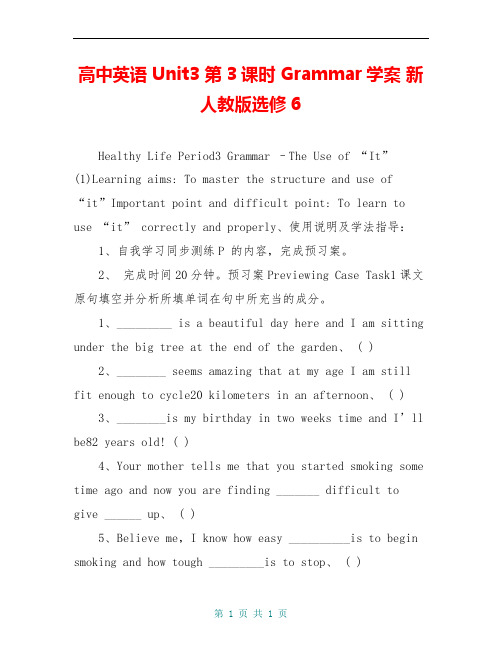
高中英语 Unit3 第3课时 Grammar学案新人教版选修6Healthy Life Period3 Grammar –The Use of “It” (1)Learning aims: To master the structure and use of “it”Important point and difficult point: To learn to use “it” correctly and properly、使用说明及学法指导:1、自我学习同步测练P 的内容,完成预习案。
2、完成时间20分钟。
预习案Previewing Case Task1课文原句填空并分析所填单词在句中所充当的成分。
1、_________ is a beautiful day here and I am sitting under the big tree at the end of the garden、 ( )2、________ seems amazing that at my age I am still fit enough to cycle20 kilometers in an afternoon、 ( )3、________is my birthday in two weeks time and I’ll be82 years old! ( )4、Your mother tells me that you started smoking some time ago and now you are finding _______ difficult to give ______ up、 ( )5、Believe me,I know how easy __________is to begin smoking and how tough _________is to stop、 ( )6、This means that after a while your body becomes accustomed to having nicotine in_________、 ( )7、As you know,if you do the same thing over andover again,you begin to do _______ automatically、 ( )8、I didn’t know,for example,that __________could do terrible damage to your heart and lungs or that__________was more difficult for smoking couples to become pregnant、 ( )Task2 分析下列句中it的用法。
高中高二英语选修UnitModule新编Grammar导学案教案
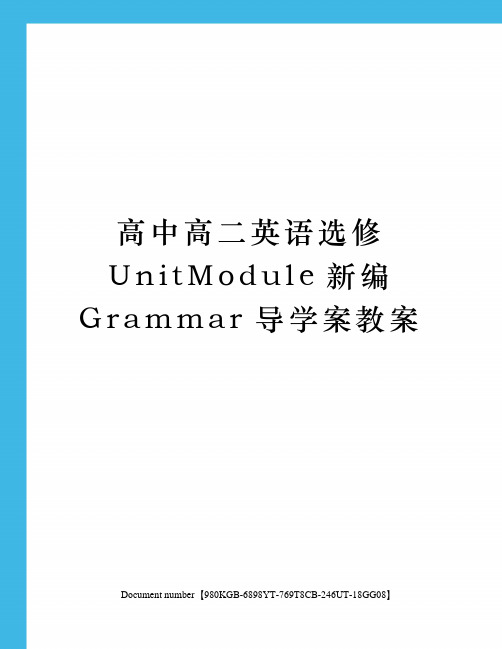
自主学习:
四、过去将来时(C)级)
1. 表示从过去某一时间看将来要发生的动作或存在的状态。过去将来时在宾语从句里最常见。如:
He said he would come.
I thought you would help him.
你今晚八点钟来时,我将会写完文章了。
By next year our teacher(teach) English for twenty years.
到明年我们的老师将已教二十年英语了。
Step3 Practice(当堂检测) and tennis for the school
3.常用hope,expect,think,intend,want,suppose等动词的过去完成时来表示未实现的希望、打算或意图。
例如:We had expected that you would be able to win the match.
合作探究:
1.Helenher keys in the office so she had to wait until her husbandhome.
C.haven’t recognized D.don’t recognize
2.─Your phone number againI______quite catch it.
─It's 9568442.
A.didn'tB.couldn'tC.don'tD.can't
3.—You haven't said a word about my new coat, Brenda. Do you like it
高中英语 Unit5 Grammar学案 新人教版必修3

高中英语 Unit5 Grammar学案新人教版必修3Grammar学案新人教版必修3【学习目标】Get the Ss to know more about Noun Clauses and the Appositive Clouse【重点难点】1、Get the Ss to learn how to use the Noun Clauses2、 How to distinguish and correctly use leading words【学法指导】Learn Noun Clauses exactly in the sentences课前预习案Previewing CaseTask1 : Revision of the Noun clauses(复习名词性从句)1、名词性从句一共有___________、___________、___________、_____________ 四种。
2、引导名词性从句的三类关联词:1)、 that /whether/if (在从句中不做成分,只起连接作用)2)、 what/ who /whom /which/ whose (在从句中做主、表、宾、定语)3)、 when /why/ when/ where (在从句中做状语)其它关联词:That he didn’tcome to school is because he was ill、She looks as if she has really been there、Things are not as they seemed to be、Task2 体会高考:1、You are saying that everyone should be equal, and this is _____ I disagree、[2004全国卷I]A、 whyB、 whereC、 whatD、 how2、 The road is covered with snow、I can’t understand _____ they insist on going by motorbike、[2004全国卷IV]A、 whyB、 whetherC、 whenD、 how3、 A modern city has been set up in _____ was a wasteland ten years ago、[天津2004]A、 whatB、 whichD、 where4、 After Yang Liwei succeeded in circling the earth, _____ our astronauts desire to do is walk in space、[上海2004]A、 whereB、 whatC、 thatD、 how5、 Along with the letter was his promise _____ he would visit me this coming Christmas、[上海2004春]A、 whichB、 thatC、 whatD、 whether6、 A story goes _____ Elizabeth I of England liked nothing more than being surrounded by clever andqualified noblemen at court、[上海2004]A、 whenB、 whereD、 that7、I think Father would like to know _____ I’ve been up to so far, so I decide to send him a quick note、[湖南2004]A、 whichB、 whyC、 whatD、 how8、The Foreign Minister said, “______ our hope that the two sides will work towards peace、”[北京2004]A、 This isB、 There isC、 That isD、 It is9、 We cannot figure out ______ quite a number of insects, birds, and animals are dying out、[北京2004]A、 thatB、 asC、 why10、 I have always been honest and straight forward, and it doesn’t matter _____ I’m talking to、[广东2004]A、 who is itB、 who it isC、 it is whoD、 it is whom Task3: Read the text again and underline the sentences containing noun clause used as appositives 细读课文,找出含有同位语从句的句子。
高中英语:unit5 grammar学案(新人教版必修1)
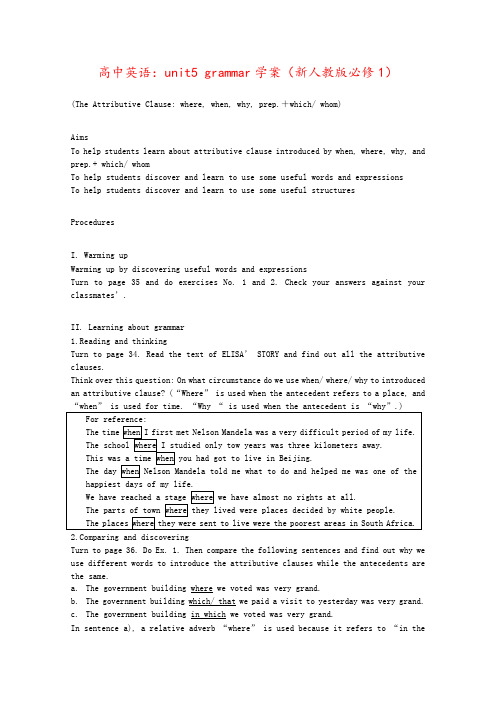
高中英语:unit5 grammar学案(新人教版必修1)(The Attributive Clause: where, when, why, prep.+which/ whom)AimsTo help students learn about attributive clause introduced by when, where, why, and prep.+ which/ whomTo help students discover and learn to use some useful words and expressionsTo help students discover and learn to use some useful structuresProceduresI. Warming upWarming up by discovering useful words and expressionsTurn to page 35 and do exercises No. 1 and 2. Check your answers against your classmates’.II. Learning about grammar1.Reading and thinkingTurn to page 34. Read the text of ELISA’ STORY and find out all the attributive clauses.Think over this question: On what circumstance do we use when/ where/ why to introduced an attributive clause? (“Where” is used when the antecedent refers to a place, andparing and discoveringTurn to page 36. Do Ex. 1. Then compare the following sentences and find out why we use different words to introduce the attributive clauses while the antecedents are the same.a.The government building where we voted was very grand.b.The government building which/ that we paid a visit to yesterday was very grand.c.The government building in which we voted was very grand.In sentence a), a relative adverb “where” is used because it refers to “in thegovernment building” which serves as the adverbial in the attributive clause. “in which” can also be used as in sentence c) because it also means “in the government building” in the attributive clause. While in sentence b), a relative pronoun “which” is used as it refers to “the government building” which serves as the object of the predicate “visited” in the attributive clause.Compare another three sentences:a.The date when I arrived was the 5th August.b.The date which/ that he told me was the 5th August.c.The date on which I arrived was the 5th August.In sentence a), a relative adverb “when” is used because it refers to “on that date” which serves as the adverbial in the attributive clause. “in which” can also be used as in sentence c) because it also means “on that date” in the attributive clause. While in sentence b), a relative pronoun “which” is used as it refers to “the date” serving as the object of the predicate “told” in the attributive clause. Read the following sentence and find outa.The reason why I got a job was because of my hard work.b.The reason that/ which he gave for getting the job was because of his hard work.c.The reason for which I got a job was because of my hard work.In sentence a), a relative adverb “why” is used because it refers to “for this reason” which serves as the adverbial in the attributive clause. “for which” can also be used as in sentence c) because it al so means “for this reason” in the attributive clause. While in sentence b), a relative pronoun “which/that” is used as it refers to “the reason” serving as the object of the predicate “gave” in the attributive clause.III. Ready used materials for attributive clauseDefinitions: Attributive clause: An attributive clause is a clause modifying a noun or pronoun in a compound sentence.Antecedent: The word being modified by an attributive clause is called the antecedent. Relative: The word that is used to introduce an attributive clause is called a relative. There are two kinds of relatives, i.e. relative pronouns including which, that, who, whom, whose, as, etc. and relative adverbs including where, when and why, etc. Note: Relatives plays three important roles in an attributive clause, i.e. introducing an attributive clause, replacing the antecedent in meaning, and functioning as a sentence element in the attributive clause.e.g.: The girl who is talking to Mr. Li over there is my sister.In the sentence, The girl is the antecedent and who is used to introduce the attributive clause as the antecedent is a person. It (who) refers to the girl and functions as the subject in the attributive clause.The choice of the relatives is the most difficult in learning the attributive clause. However, there are some rules that can help us choose the correct relatives. Usually, which relative to choose depends on what the antecedent is and what sentence elementclauses.If a relative functions as the object of a preposition in the attributive clause, the preposition can usually be placed before the relative. In this situation, we use “which” for things and “whom” for people, and they can never be omitted. However, if the preposition and a verb form a set phrase in the attributive clause, they should not be separated:The school (which/ that) he once studied in is very famous. The school in which he once studied is very famous.This is the girl (who/ whom) I went to the Great Wall with. This is the girl with whom I went to the Great Wall.The sentence “This is the watch (which/ that ) you are looking for.” can not be changed into “This is the watch for which you are looking.” because “look for ” is a set phrase.Now turn to page 36 and let’s do Ex.2 and 3.IV. Closing down by doing a quizTo end the period you are going to take a quiz on attributive clause.Choose the best answer:1.The weather turned out to be very good, ____ was more than we could expect.A. whatB. whichC. thatD. it2.After living in Pairs for fifty years he returned to the small town ____ he grew up as a child.A. whichB. whereC. thatD. when3.The house ______ we live is not large.A. whichB. in whichC. on whichD. at which4.Recently I bought an ancient Chinese vase, _____ was very reasonable.A. which price C. the price of which C. its price D. the price of whose5.He lived in London for 3 months, during ____ time he learned some English.A. thisB. whichC. at whichD. some6.I will never forget the day _____ he came to see me.A. thatB. whichC. at whichD. when7.The visitor asked the guide to take his picture _____ stands the famous tower.A that B. where C. which D. there8.The students ____ department Ms King worked ten years ago look down upon women.A. in whichB. in thatC. in whoseD. whose9. I don’t like _____ you speak to her.A. the wayB. the way in thatC. the way whichD. the way of which10. I had neither a raincoat nor an umbrella. _______ I got wet through .A. It’s the reasonB. That’s whyC. There’s whyD. It’s how。
高中英语 Unit5 Grammar学案 新人教版必修2
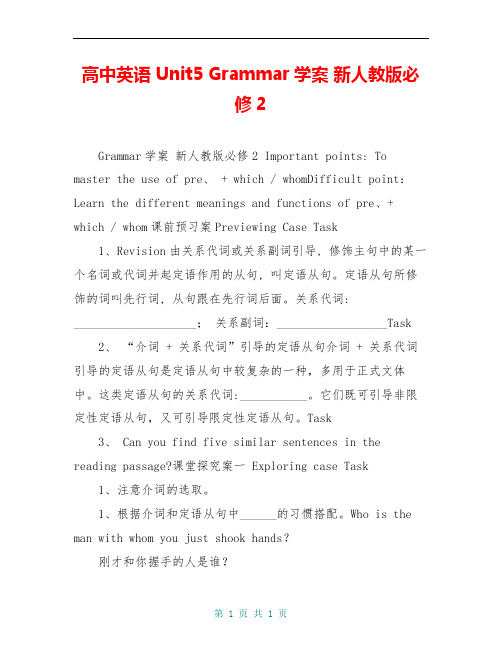
高中英语 Unit5 Grammar学案新人教版必修2Grammar学案新人教版必修2 Important points: To master the use of pre、 + which / whomDifficult point:Learn the different meanings and functions of pre、+ which / whom课前预习案Previewing Case Task1、Revision由关系代词或关系副词引导, 修饰主句中的某一个名词或代词并起定语作用的从句, 叫定语从句。
定语从句所修饰的词叫先行词, 从句跟在先行词后面。
关系代词:____________________;关系副词:__________________Task2、“介词 + 关系代词”引导的定语从句介词 + 关系代词引导的定语从句是定语从句中较复杂的一种,多用于正式文体中。
这类定语从句的关系代词:___________。
它们既可引导非限定性定语从句,又可引导限定性定语从句。
Task3、 Can you find five similar sentences in the reading passage?课堂探究案一 Exploring case Task1、注意介词的选取。
1、根据介词和定语从句中______的习惯搭配。
Who is the man with whom you just shook hands?刚才和你握手的人是谁?2、根据定语从句______的需要。
He had a bad cold,because of which he didnt attend the meeting、他患了重感冒,因此未能参加会议。
3、根据意思也可用复杂介词,如 by means of,as a result of,in front of,in the back of ,all of,most of 等,The instrument ________ which the temperature is measured is called thermometer、用来测量温度的仪器叫温度计。
高中英语Unit4Grammar学案新人教必修3
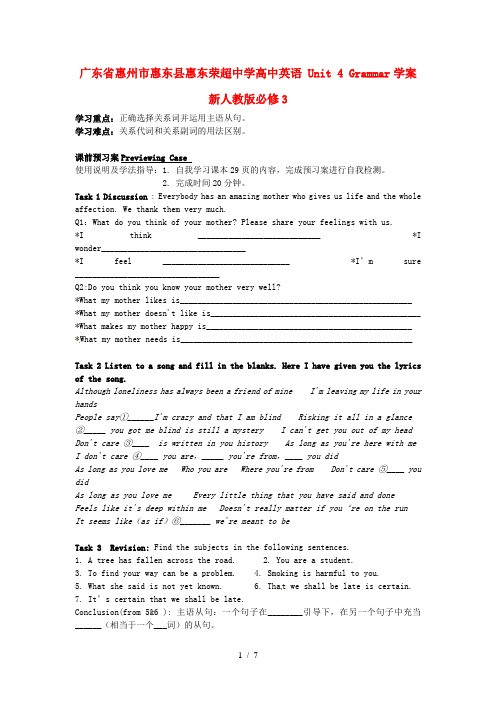
广东省惠州市惠东县惠东荣超中学高中英语 Unit 4 Grammar学案新人教版必修3学习重点:正确选择关系词并运用主语从句。
学习难点:关系代词和关系副词的用法区别。
课前预习案Previewing Case使用说明及学法指导:1. 自我学习课本29页的内容,完成预习案进行自我检测。
2. 完成时间20分钟。
Task 1 Discussion: Everybody has an amazing mother who gives us life and the whole affection. We thank them very much.Q1:What do you think of your mother? Please share your feelings with us.*I think ____________________________ *I wonder_________________________________*I feel _____________________________ *I’m sure _________________________________Q2:Do you think you know your mother very well?*What my mother likes is_____________________________________________________ *What my mother doesn't like is________________________________________________ *What makes my mother happy is_______________________________________________ *What my mother needs is_____________________________________________________Task 2 Listen to a song and fill in the blanks. Here I have given you the lyrics of the song.Although loneliness has always been a friend of mine I'm leaving my life in your handsPeople say①______I'm crazy and that I am blind Risking it all in a glance ②_____ you got me blind is still a mystery I can't get you out of my head Don't care ③____ is written in you history As long as you're here with me I don't care ④____ you are,_____ you're from,____ you didAs long as you love me Who you are Where you're from Don't care ⑤____ you didAs long as you love me Every little thing that you have said and doneFeels like it's deep within me Doesn't really matter if you‘re on the runIt seems like(as if)⑥_______ we're meant to beTask 3 Revision: Find the subjects in the following sentences.1. A tree has fallen across the road.2. You are a student.3. To find your way can be a problem.4. Smoking is harmful to you.5. What she said is not yet known.6. Tha t we shall be late is certain.7. It’s certain that we shall be late.Conclusion(from 5&6 ): 主语从句:一个句子在________引导下,在另一个句子中充当______(相当于一个___词)的从句。
高中ModuleUnitGrammar学案教案
2009-2010学年度高二英语讲学案主备人:刘海燕Module5 Unit1 Grammar 2一.预习作业(完成形式并说明在句中的语法成分)1.(Swim)is good for your health.2.I love (Swim)in the sea.3.I keep fit by (Swim)every day.4.Her (Swim)is improving day by day.5.The old man has to use a (walki)stick.二.随堂练习完成page92C2三.学海拾贝1.We use Verb-ing (not a infinitive), after the following words:admit dislike imagine delay consider mind understand avoid enjoy practise miss finish keep suggest2.We can use a verb-ing or an infinitive after the following verbs with little difference in meaning but sometimes with some difference in meaning or usage such as:continue prefer begin hate like start love (little difference)forget regret remember mean try go on (with some difference)四.课后巩固1. She said she___ her uncle very much and hoped ____him.A. missed, to hear fromB. missed, to hearC. misses, hearing fromD. misses, hearing2. ______a living, she had to work from morning till night.A. To makeB. madeC. MakingD. To have made3. Mrs Brown regretted____ his son.A. beatedB. beatingC. beatD. beaten4. I often hear him ___about the great writer.A. to talkB. talkC. speakingD. to tell5. Missing the last bus means___ . to walk B. walking C. walked D. walk6. Paul doesn't have to be made____ . He always works hard.A. studyB. to studyC. studiedD. studying7. It was unbelievable that the fans waited outside the gym for three hours just ____ a look at the sports starts.A. hadB. havingC. to haveD. have8. The boy wanted to ride his bicycle in the street, but his mother told him __.A. not toB. not to doC. not do itD. do not9. —I didn't hear you come in last night.—That's good. We tired ___ noisy.A. not toB. to be notC. to beD. not to be10. —I hear that you and Francis will spend your vacation in Nepal next spring.—Yes, we are planning _____. A. to B. to be C. it D. to do it11. I can hardly imagine Peter ____ across the Atlantic Ocean in five days.A. sailB. to sailC. sailingD. to have sailed12. — The light in the office is still on.— Oh, I forgot_____A. turning it offB. turn it offC. to turn it offD. having turned it off13. I would appreciate ____ back this afternoon.A. you to callB. you callC. your callingD. you’re calling14. How about the two of us ____ a walk down the garden?A. To takeB. takeC. takingD. to be taking15. — I must apologize for ____ ahead of time.—That’ all right.A. letting you not knowB. not letting you knowC. letting you know notD. letting not you know16. — You were brave enough to raise objections at the meeting.— Well, now I regret ____ that.A. to doB. to be doingC. to have doneD. having done17. He has always insisted on his ___ Dr Turner instead of Mr Turner.A. been calledB. calledC. having calledD. being called18. Do you mind ___ alone at home?A. Jane leavingB. Jane having leftC. Jane’s being leftD. Jane to be left19. She looks forward every spring to ___ the flower-lined garden.A. visitB. paying a visitC. walk inD. walking in20. Once your business becomes international, ___ constantly will be part of your life.A. you flyB. your flightC. flightD. flying五.你想挑战吗?1. While shopping, people sometimes can’t help ___ into buying something they don’t really nee d.A. to persuadeB. persuadingC. being persuadedD. be persuaded2. — What do you think made Mary so upset?— ___ her new bicycle.A. As she lostB. LostC. LosingD. Because of losing3. — Let me tell you something about the journalists.—Don’t you remember ___the story yesterday?A. toldB. tellingC. to tellD. to have told4. One learns a language by making mistakes and ___them.A. correct B. Correcting C. corrects D. to correct5. Fishing is his favorite hobby, and ____A. he’d like to co llect coin as wellB. he feels like collecting coins, tooC. to collect coins is also his hobbyD. collecting coins also gives him great pleasure。
高中MUGrammar学案教案
高二英语模块八第一单元语法学案关于英语中的否定句拓展知识:1. 一般否定I don’t know this. No news is good news.There is no person /not a person/not any person in the house.2. 特指否定He went to his office, not to see him. I am sorry for not coming on timeI don’t think/believe/suppose/feel/imagine you are right.3. 部分否定I don’t know all of them. I can’t see everybody/everythingAll the answers are not right.并非所有答案都对。
All is not gold that glitters. 闪光的不一定都是金子。
Both of them are not right.并非两人都对。
4. 全体否定None of my friends smoke I can see nothing/nobody Nothing can be so simple as this.5. 延续否定You didn't see him, neither/nor did I.He doesn't know English, let alone/to say nothing of/not to speak of French. 6. 半否定句We seldom/hardly/scarcely/barely hear such fine singing. I know little English.7. 双重否定You can't make something out of nothing. What's done cannot be undone.There is no sweet without sweat. No gain without pains.8. 排除否定Everyone is ready except you. He did nothing but play. But for your help, I couldn't do it.9. 加强否定I won't do it at all. I can't see it any more. He is no longer a boy. I. Multiple choice:单选题1.His mother had talked to him for many minutes while he was watching TV, but __.A. a little did he hearB. little did he hearC. little heard heD. a little heard he2.During the war, ____but also he lost his wife and his child.A. not was his job in the lab taken awayB. not only was his job in the lab taken awayC. not merely his job in the lab was taken awayD. not just was taken away his job in the lab3.I think this is the first time that we have met.___anywhere.A. Before have we never seen each otherB. Never before we have seen each otherC. Each other have we seen never beforeD. Never before have we seen each other4.—— The old man wouldn’t stay at home for a rest even if it rained.——____.He would feel sick if he stayed home for one day.A. So would my grandpaB. So wouldn’t my grandpaC. Neither would my grandpaD. Nor wouldn’t my grandpa5.By no means ___ to our plan for the trip.A. will she agreeB. she will agreeC. agrees sheD. willagree she6.They went into a small house but ___.A. no persons did they findB. not a person found theyC. not a person did they findD. not a person they found7.Henry often helps look after Granny Wang, but___.A. seldom is GeorgeB. seldom George doesC. seldom does GeorgeD. seldom looks George after Granny Wang8.Nothing but two ancient Chinese coins ____ after they took out the jar.A. did they find in itB. they found in itC. in it did they findD. in it found they翻译题1.这两本书都不是英国出版的。
高中英语 Unit 3 Grammar学案 新人教版必修3
高中英语 Unit 3 Grammar学案新人教版必修3Grammar学案新人教版必修3Important points: To learn what is noun clause and to master the use of noun clauses used as the object and predicative、Difficult point:Learn to use the conjunctions :that, whether, if, what, which, who, where, when, why, how etc、课前预习案Previewing Case Task1 指出下列名词在句中所做的成分。
1、The world loves nature、2、Knowledge is power 、3、We Chinese are peace-loving、连接划线部分充当相同成分的句子并指出其在句中所做的成分。
His job is important、I don’t know about the fact that he is a teacher、This is his job、I don’tlike what he does every day、I don’t like his job、 What he does is important、I don’t know about the man, Mr、White、 This is what he does every day、总结:名词从句的功能相当于名词词组, 它在复合句中能担任、、、等。
因此根据它在句中不同的语法功能,名词从句又可分别称为、、和。
Task2与同伴交流学习课本第17-18页的内容找出课文所有包含宾语从句和表语从句的句子。
课堂探究案 Exploring Cases 探究点一: 表语从句(一)定义:表语从句放在,充当复合句中的。
高中MuGrammar学案教案
牛津高二英语M7U4 Public transport教案Grammar and usage分词作定语和状语分词分为此刻分词和过去分词,拥有动词、形容词和副词的特点,在句中作定语、补足语、表语或状语。
其否认形式是直接在前方加 not。
分词的基本状况以下表所示:类型主动语被动语态时间意义语态意义态现一Doing Being done与谓语动词同时依据语态形式,在般或几乎同时发生主动或被动意义分式词完Having Havingbeen发生在谓语动词之依据语态形式,成done done前主动或被动意义式过去分done无表示动作达成被动意义词1分词作定语(1)此刻分词作定语时和被修饰词之间为主动关系,表示动作正在或常常发生。
单个此刻分词作定语放在被修饰词前方,此刻分词短语作定语则放在被修饰词的后边。
【考例 1】There have been several new events __ 2008 Beijing Olympic Games.(06 年北京卷) A. add _ to the program for the B. to add C. addingD. added分析 D。
此题考察非谓语动词作定语用法,题干部分可改写为: There have been several new events (that have been) added to the program for the 2008 Beijing Olympic Games.(2)过去分词作定语时和被修饰词之间常常是被动关系,表示动作已经达成。
单个的过去分词作定语放在被修饰词的前方,过去分词短语作定语则放在被修饰词的后边。
【考例 2】Five people won the“China’s Green Figure” award, a titleto__ ordinary people for their contribution to environmental protection.(06 年山卷)A. being givenB. is givenC. givenD. was given分析 C。
- 1、下载文档前请自行甄别文档内容的完整性,平台不提供额外的编辑、内容补充、找答案等附加服务。
- 2、"仅部分预览"的文档,不可在线预览部分如存在完整性等问题,可反馈申请退款(可完整预览的文档不适用该条件!)。
- 3、如文档侵犯您的权益,请联系客服反馈,我们会尽快为您处理(人工客服工作时间:9:00-18:30)。
高中M u G r a m m a r学案
教案
TPMK standardization office【 TPMK5AB- TPMK08- TPMK2C- TPMK18】
Unit2 Grammar
Multiple Choice:
1. — Are there any English story books for us students in the library?
— There are only a few, ___________.
A. if any
B. if there
C. if some
D. if has
2. — Would you like to go with us? — Yes, _____________.
A. I'd
B. I'd like
C. I'd like to
D. I'd like to do
3. — Would you like to have a try once again? — _____________.
A. Yes, I like
B. No, I don’t like it
C. Yes, I want very much
D. Yes, I’d like to
4. — What do you think made Mary so upset? — ___________ her bicycle.
A. As she lost
B. Lost
C. Losing
D. Because of losing
5. — When did they get down to the job? — ___________.
A. Until they left
B. Till they arrived
C. Since they finished it
D. Not until they turned to me
6. — Are you angry? — Yes. He should at least answer when _____________.
A. speaking
B. spoken to
C. spoken
D. speaking to
7. Be careful while _________ the street.
A. to cross
B. crossing
C. he crosses
D. being cross
8. _______ us for a dinner, don’t you?
A. Don’t you join
B. Join
C. Have to join
D. Let’s join
9. I promise we’ll be there at 6, _________.
A. rainy or shine
B. rains or shining
C. rain or shine
D. rain or shining
10. In the car accident the child was hurt, but ___________.
A. the mother is killed
B. the mother killed
C. the mother being killed
D. the mother has killed
11. __________ I don’t remember where I met him.
A. Fact is which
B. what the fact is that
C. The fact is what
D. Fact is
12. He raised his hand __________ silence.
A. as if to command
B. as though he going to command
C. as though to command
D. as if he commanding
13. Francis Preston Blair, Jr., _____ born in Kentucky, lived and practiced law in
Missouri.
A. was
B. he was
C. although
D. who he was
14. We are to install this instrument ____________.
A. as originally planned
B. as it originally planned
C. as was originally planned
D. as it being originally planned
15. _______, people and objects are presented in a flat, often angular, abstract manner in Jacob
Lawrence’s paintings.
A. Always able to recognize
B. The ability to recognize always
C. While always recognizable
D. Always can be recognized
16、He intends to _______ a job as soon as she graduates to help support the family.
A. apply to
B. apply for
C. apply
D. apply of
17、---What’s going on? You don’t look quite happy.
--- Dad said he would take me to the zoo this weekend, but he seems to have forgotten it today. He is always ________.
A. keeping his promise
B. eating his words
C. breaking his promise
D. losing his promise
18、After restoration, the old temple dating from the Ming Dynasty ______ a new look.
A. takes on
B. takes up
C. takes off
D. takes in
19、The young mother ____ save her son though he was infected with a deadly disease.
A. was desperate for
B. was desperate to
C. was intended to
D. was intended for
20、--- The weather forecast says that it will rain tomorrow.
--- _______, I will have to stay at home.
A. If it will
B. If not
C. If not so
D. If so
一、重点单词
1. adj. 普遍的,公认的;宇宙的
2.. n.倾向,趋势,潮流
3. adj. 冷酷的,无情的
4. . n. 结婚,婚姻
5.. adj.户外的,野外的
6.. adj.无条件的
7.. n.奴隶制度 8.. n.&vi.衰落,衰败;下降
9.. vt.敢,敢于,胆敢10. vt.征召……入伍;起草11.. n.背诵,朗诵;叙述;列举12.. n.失业
13.. vi.&n.颤抖,发抖 14.. n.地位,身份;情形,状态
15.. n.歧视;辨别,区分 16.. n. 名声,声誉
17.. n.吸引力 18.. n.前沿,领域
19.. n.单身汉;学士学位 20.. adj.精神的,心理的
二. 重点短语
1. 相爱,坠入爱河
2. 醉心于,沉溺于
3. 对实施控制,控制
4. 食言,收回承诺
5. 被处死
6. 申请________应用于,适用于
7. 扎根于之中 8. 发财,赚钱
__________寻求致富的机会
9. 征召……入伍 10. 解散,分手_________出故障
11. 呈现,体现12. 试用,测试。
